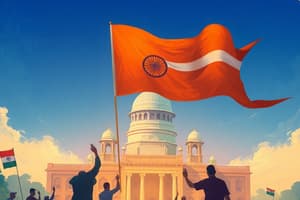Podcast
Questions and Answers
What primary function does the Parliament serve in Indian democracy?
What primary function does the Parliament serve in Indian democracy?
- To provide employment opportunities to citizens
- To allow citizens to participate in decision-making (correct)
- To oversee the military operations of the country
- To represent only the ruling political party's views
Which event marked the beginning of India’s independence struggle?
Which event marked the beginning of India’s independence struggle?
- The abolition of the British Raj
- The signing of the Treaty of Versailles
- The Government of India Act of 1909
- The formation of the Indian National Congress in 1885 (correct)
What were the ideologies that inspired people during the independence movement?
What were the ideologies that inspired people during the independence movement?
- Freedom, equality, and participation (correct)
- Capitalism and communism
- Industrialization and urbanization
- Socialism and totalitarianism
What was a significant limitation of the early legislatures formed under British rule?
What was a significant limitation of the early legislatures formed under British rule?
What strategy did nationalists adopt against the British government during the freedom movement?
What strategy did nationalists adopt against the British government during the freedom movement?
How did colonial rule impact the citizens' willingness to participate in governance?
How did colonial rule impact the citizens' willingness to participate in governance?
What change occurred as a result of the experience of colonial rule during the independence struggle?
What change occurred as a result of the experience of colonial rule during the independence struggle?
What does having the consent of citizens indicate in a democracy?
What does having the consent of citizens indicate in a democracy?
What principle is established in the Constitution of independent India regarding voting rights?
What principle is established in the Constitution of independent India regarding voting rights?
What is the basic idea that underpins a democracy according to the content?
What is the basic idea that underpins a democracy according to the content?
What does the term 'consent' refer to in the context of democracy as mentioned?
What does the term 'consent' refer to in the context of democracy as mentioned?
What responsibility does the government have towards its citizens post-independence?
What responsibility does the government have towards its citizens post-independence?
How does the text describe the relationship between citizens and public institutions in a democracy?
How does the text describe the relationship between citizens and public institutions in a democracy?
Flashcards are hidden until you start studying
Study Notes
Importance of Democracy in India
- India is proud to be a democracy, emphasizing citizen participation in decision-making.
- Consent of citizens is essential for all democratic governments, forming the foundation of democracy.
- The Parliament acts as a key institution facilitating citizen involvement and government accountability.
Historical Context of Independence
- India gained independence on 15 August 1947 after a long struggle for freedom.
- Various societal groups contributed to the freedom movement, driven by ideals of freedom, equality, and decision-making participation.
- Under British colonial rule, criticism of government decisions was dangerous, which changed with the advent of the freedom movement.
Early Legislative Developments
- The Indian National Congress, established in 1885, advocated for elected legislators with the right to discuss budgets and question government actions.
- The Government of India Act 1909 introduced some elected representation, but voting was not universal, limiting public participation.
Transition to Independence
- The nationalists concluded that every citizen would have the right to participate in independent India’s governance.
- Independence signified that the government must respond to the needs and demands of its citizens rather than acting arbitrarily.
- The Constitution of India institutionalized the principle of universal adult franchise, granting voting rights to all adult citizens.
Concept of Consent in Democracy
- Consent is the cornerstone of a democratic government, reflecting the desire and approval of the populace.
- Democratic functioning relies on citizen engagement and trust in government and public institutions.
- The citizen is viewed as the most vital entity in a democracy, emphasizing individual rights and governance accountability.
Studying That Suits You
Use AI to generate personalized quizzes and flashcards to suit your learning preferences.




